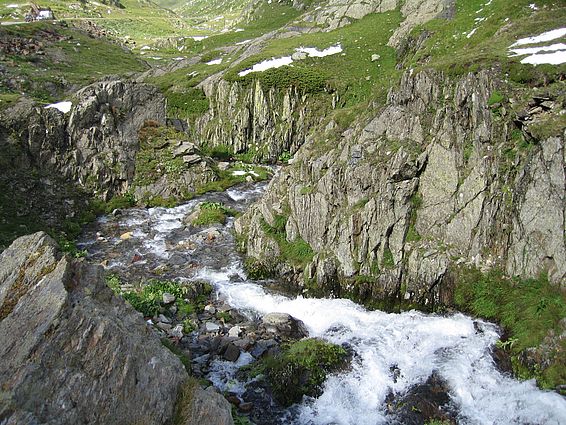A study by the Swiss Federal Institute of Technology Lausanne (EPFL) and the WSL Institute for Snow and Avalanche Research (SLF) has found a steady rise in the temperature of Swiss rivers, which is putting ecosystems under stress and could limit the use of watercourses, in the nuclear power industry for example.
Melt water from snow and glaciers cools the water in streams. In the past, the water temperature of Swiss rivers has usually remained low enough at high air temperatures to protect aquatic life from harm. But global warming is upsetting the balance, because since 1979 the average temperature in Swiss watercourses has risen by roughly 0.3° Celsius every 10 years. This means they are warming up almost as quickly as the atmosphere.
This was one finding of a study conducted by the EPFL Cryosphere Sciences Laboratory (CRYOS), the SLF and a number of other research institutes. For the study, scientists analysed data from measuring stations by 52 streams and rivers in Switzerland.
One cause of warming was found to be higher air temperatures, especially in summer. In 2018, for example, fish had to be moved to rivers at higher altitudes to prevent them from dying of overheating, lack of water and spreading diseases. Another cause of warming is the 10% decrease in water flow over the past 20 years.
The effect of melting snow and glaciers can already no longer compensate for this warming. And this trend could worsen in future if glaciers continue to shrink and there is less snowfall in winter, as this would reduce the volume of melt water, potentially leading to a further temperature increase, especially in mountain streams. Higher water temperatures not only threaten ecosystems, but can also become a problem for nuclear power stations, for instance, which draw their cooling water from rivers.
EPFL press release
Contact ¶
Adrien Michel
Laboratoire des sciences cryosphériques (CRYOS)
EPFL
adrien.michel(at)epfl.ch
+41 021 69 3 5 2 37
Links and documents ¶
Copyright ¶
WSL und SLF stellen Bildmaterial zur Bebilderung von Presseartikeln im Zusammenhang mit dieser Medienmitteilung kostenfrei zur Verfügung. Eine Übernahme der Bilder in Bilddatenbanken und ein Verkauf der Bilder durch Dritte sind nicht gestattet.

